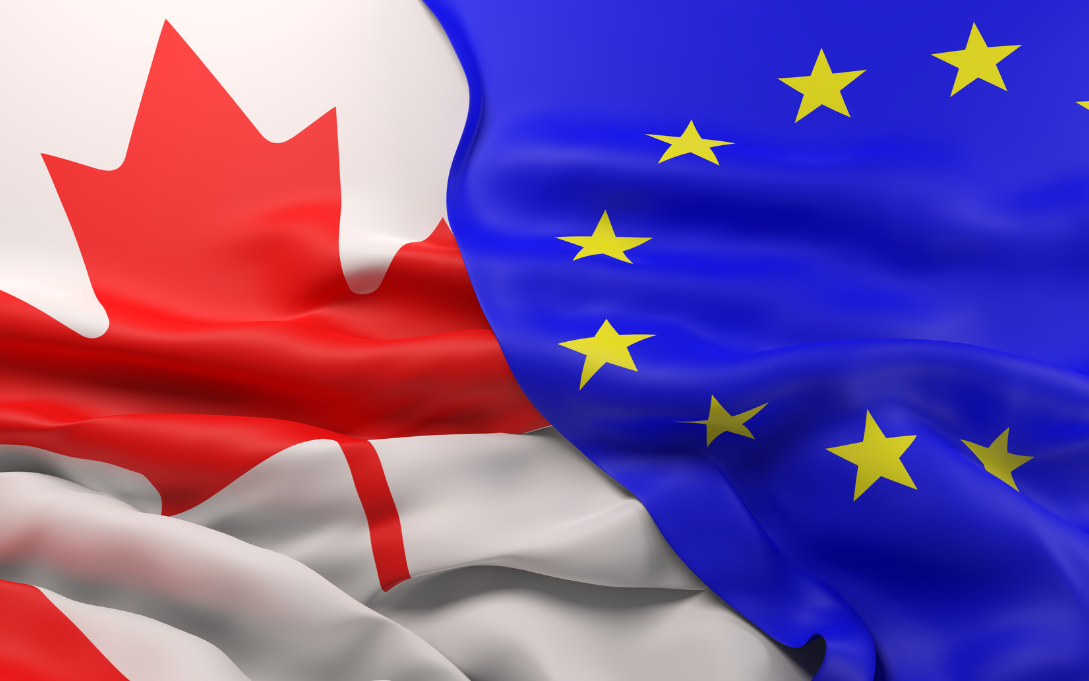EU-Canada Summit to make significant steps forward in key areas

Objectives
The leaders will adopt a number of initiatives to advance the green and digital transition, create jobs and promote economic growth decoupled from emissions, increase the resilience of our economies, and strengthen cooperation on science, technology, research and innovation.
The EU and Canada will also reaffirm their support to the rules-based international order and to the promotion of peace and security. Thus, support for Ukraine and the situation in the Middle East will be high on the leaders’ agenda.
EU - Canada Strategic Partnership and a unique trade relationship
Since 2017, the Strategic Partnership Agreement (SPA) has served as an accelerator for EU – Canada relations, providing the framework for strategic dialogue and cooperation on a wide range of issues including on energy, environment and climate change, digital issues, migration, international peace and security, human rights and effective multilateralism.
The intensified cooperation in these areas has led to significant progress in a number of areas leading into the Summit:
Trade is the cornerstone of EU-Canada cooperation. Since 2017, the EU-Canada Comprehensive Economic and Trade Agreement (CETA) has boosted bilateral trade to unprecedented numbers. Notably, CETA reaffirms our shared principle of rules-based trade.
CETA removed duties on 98% of products. Compared to pre-CETA levels, trade in goods increased by 66%, amounting to €77 billion in 2022. Similarly, the increase of trade in services increased by 11%, since 2016 – setting a new record of €41 billion in 2022. Overall, bilateral combined trade has increased by an impressive 65% in comparison to pre-CETA times.
CETA advances cooperation towards open and resilient economies on both sides of the Atlantic. Under CETA, the EU-Canada Strategic Partnership on Raw Materials focuses on the integration of EU-Canada value chains of materials critical to the digital and green transition. Since 2022, EU raw materials imports from Canada grew by 27% (€10 billion).
The Green and Digital transition
The EU and Canada have deepened their cooperation to address the triple planetary crisis of climate change, biodiversity loss and pollution, and to accelerate their energy transition. The Summit will take further steps in this regard, also in order to support the effective implementation of the Paris Agreement and the Kunming-Montreal Global Framework for Biodiversity towards the shared objective of fostering a circular, nature-positive, and global net-zero emissions economy by 2050.
The EU and Canada are also committed to deepening digital cooperation towards a positive and human-centric digital economy and society. Beyond the bilateral Digital Dialogue launched in 2019, the EU and Canada intend to deepen collaboration on emerging technologies (e.g. artificial intelligence, and resilient international connectivity infrastructure) as will be reaffirmed at the Summit.
EU-Canada cooperation on research and innovation is strong and growing. With 473 participations and 391 grants, Canada ranked 3rd among non-associated third countries (after the United States and China) in its participation in the Horizon 2020 programme (2014-2020). The Summit will look at step to be taken to expand Canada’s participation under Horizon Europe.
Foreign Policy
The Summit will also be an opportunity to reconfirm the European Union’s and Canada’s unwavering support for Ukraine. The global ramifications of the war will be discussed, including food insecurity. With Canada as a world leader on food exports, the potential for food security cooperation has been seized by means of Canadian companies’ participation in the Solidarity Lanes.
The EU and Canada enjoy an extensive collaboration on security and defence. Canada is one of the most consistent partner contributors to the EU Common Security and Defence Policy (CSDP) missions and operations including in the European Union Police Mission for the Palestinian Territories (EUPOL COPPS) and European Union Advisory Mission Ukraine.
Canada is among the first non-EU countries to participate in defence-cooperation (PESCO) projects, on military mobility (2021) and soon on the network of logistic hubs, and further cooperation is likely to follow.
For the EU and Canada, human rights are central to our foreign policy cooperation. We have deepened our cooperation on gender equality and the empowerment of women and girls, both within multilateral fora and in the context of trade, development and security and defence.
The EU and Canada’s common objective to support democratic principles and values worldwide has prompted Canada’s participation in several EU elections observation missions, including in Guatemala, Liberia, Maldives, Paraguay, Sierra Leone, and Zimbabwe. The Summit is expected to reaffirm these commitments.
People-to-people contacts
Education and youth mobility are a key element of our partnership. Since 2014, each year a growing number of higher education students and academic staff benefitted from the Erasmus+ short-term exchanges between Canada and the EU. In parallel, hundreds of researchers on both sides of the Atlantic became recipients of Marie Skłodowska-Curie Actions (MSCA) grants for their training and career development and for academic, scientific and business collaboration. These mobilities are essential for our strategic partnership to strengthen and prosper.




